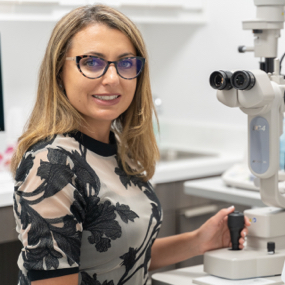Our eyes are one of the most vital organs in our body, yet they are often overlooked when it comes to nutrition. While we may focus on foods that can boost eye health, it’s equally important to know which foods could be doing more harm than good. Certain dietary choices taken consistently over a period of time can lead to inflammation, oxidative stress, and even long-term damage to your vision . These include:
- Processed and sugary foods
- Trans fats
- High-sodium foods
- Refined carbohydrates
- Alcohol
Processed & Sugary Foods
Processed and sugary foods, when consumed frequently and regularly over a long period of time, can affect both our overall health and eye health. These foods often contain additives, preservatives, and artificial ingredients that have the potential to contribute to chronic inflammation throughout the body. Inflammation plays a role in the development of some eye conditions, including age-related macular degeneration (AMD) and cataracts.
Additionally, a consistently high sugar intake over time can lead to imbalances in blood sugar levels, which may increase the risk of developing complications such as diabetic retinopathy, a condition that affects the blood vessels in the eyes. To support your long-term eye (and overall) health, it’s best to limit processed and sugary foods where possible. Instead, try to focus on eating healthier options like fresh fruits and vegetables, which provide vitamins and antioxidants that help protect the eyes from oxidative stress and inflammation.
Trans Fats
Trans fats are typically found in fried, baked, and processed foods. These fats are created through a process called hydrogenation, which helps oils become more solid and last longer on store shelves. Over time, consistently consuming foods that are high in trans fats can also have an impact on ocular health.
Studies have suggested that trans fats may also contribute to an increased risk of developing age-related macular degeneration (AMD), one of the leading causes of vision loss in older adults. Diets high in trans fats may interfere with the absorption of omega-3 fatty acids, which are important for eye health. It’s a good idea to limit trans fat intake where possible, and opt for healthier fat sources like those found in olive oil, avocados, and nuts.
High-Sodium Foods
Over time, a diet high in sodium can contribute to elevated blood pressure, which may affect the health of your eyes. High blood pressure can put strain on the sensitive blood vessels in the eyes, potentially leading to vision conditions like hypertensive retinopathy. To support healthy blood pressure and keep your eyes healthy, it’s helpful to reduce your sodium intake. One way to do this is to limit processed foods and try to incorporate fresh fruits and vegetables as a larger part of your diet.
Refined Carbohydrates
Refined carbohydrates are commonly found in processed foods such as white bread, pasta, and sugary snacks. These types of carbohydrates are stripped of their natural fiber and nutrients during processing, making them less nutritious than whole-grain alternatives. They also have a high glycemic index (GI), meaning they are quickly broken down into glucose, leading to rapid spikes in blood sugar levels.
Over time, these frequent blood sugar spikes can cause inflammation in the body, which is a known factor in the development of chronic conditions, including age-related macular degeneration (AMD). Choosing whole-grain options and limiting refined carbs can help reduce these risks.
Alcohol
Excessive alcohol consumption can also have negative effects on eye health. Heavy drinking has been linked to a higher risk of developing cataracts and age-related macular degeneration (AMD). Additionally, alcohol can interfere with the absorption of essential vitamins and minerals that are crucial for maintaining healthy vision.
It’s important to note that moderation is key when it comes to alcohol consumption. Drinking in excess can not only harm your eyesight but also have detrimental effects on your overall health.
Foods for Healthy Eyes

While avoiding certain foods is important for maintaining healthy eyes, incorporating specific foods into your diet can also have a positive impact on eye health. Some of these could include:
- Leafy green vegetables such as spinach and kale, which are rich in antioxidants like lutein and zeaxanthin help protect against age-related eye diseases.
- Fatty fish like salmon, tuna, and sardines, which are high in omega-3 fatty acids that promote healthy tears and prevent dry eyes.
- Eggs (for most people, please ask your health care professional), which contain nutrients like lutein, zeaxanthin, and vitamins A, C, and E that are beneficial for eye health.
We recommend downloading the online book The Toyos Dry Eye Diet by Dr. Rolando Toyos, MD if you’d like some more recommendations.
In addition to incorporating these specific foods, maintaining a well-balanced diet that includes a variety of fruits, vegetables, whole grains, and lean proteins can also contribute to overall eye health.
See the World Clearly with Brantford Eye Care
While there is no one specific food or diet that guarantees perfect eyesight, making conscious choices about what we put into our bodies can greatly impact the health of our eyes. By avoiding certain foods and incorporating others into our diets, we can help prevent age-related eye diseases and maintain healthy vision for years to come.
At Brantford Eye Care, we deeply care about your vision and overall well-being. We understand that your eyes are not just windows to the world but also to your health. That’s why we emphasize the importance of regular eye exams to catch any potential issues early and support your vision for years to come. Beyond exams, we believe that a healthy lifestyle plays a vital role in maintaining optimal eye health. Our team is here to guide you, offering personalized advice on proper nutrition, protective practices, and daily habits that can improve and preserve your vision.
Contact us today to book an appointment and discover how we can help you maintain and enhance your eye health.




